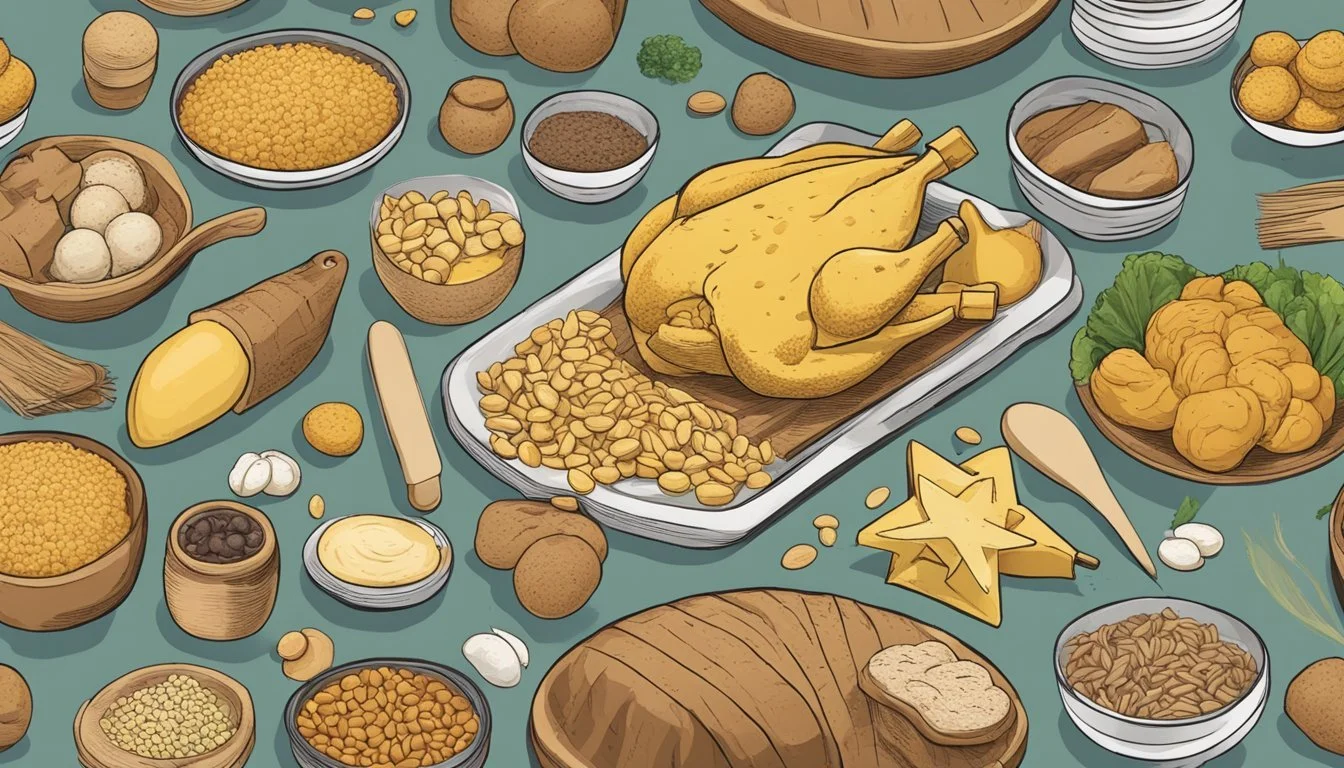Does the Dr. McDougall’s Starch Diet Work for Carb-Lovers' Weight Loss?
Unpacking the Efficacy for Sustainable Slimming
The Dr. McDougall's Starch Diet, established by Dr. John McDougall, positions itself as a revolutionary approach for those looking to shed pounds while enjoying a carbohydrate-rich menu. The diet is grounded in the consumption of unprocessed whole foods and generous amounts of starches. Its foundational principle asserts that starchy foods are not the enemy of weight loss; rather, they can be the cornerstone of a healthy, slimming diet. Proponents argue that by focusing on natural starches, fruits, and vegetables, while avoiding animal products and oils, individuals can achieve weight loss and improve their overall health.
Initial scepticism towards a starch-centric diet springs from prevailing low-carb diet trends which often label carbohydrates as weight-gain culprits. However, the Starch Solution advocates for the use of whole, plant-based starches, not the refined carbs commonly found in processed foods. This diet touts benefits such as sustained satiety, consistent energy levels, and the avoidance of harmful fats. Additionally, the high fiber content inherent in starch-rich foods aligns with improved metabolic processes.
While the diet suggests a substantial intake of carbs, for weight loss, a modification in the percentage of daily calories from starch is recommended. This adjusts the typical 70% calorie contribution from starches to a lower proportion to facilitate a caloric deficit while maintaining adequate nutrition. Whether the Starch Diet stands up as an effective methodology for weight loss among carb-lovers has been a topic of discussion, warranting a closer examination of its principles and the experiences of those who have followed it.
Understanding the Starch Solution
The Starch Solution is a high-carbohydrate, low-fat diet that claims benefits such as weight loss and improved energy levels by focusing on plant-based, unprocessed foods. It positions complex carbohydrates as the centerpiece of dietary intake.
Principles of the Starch Diet
The core principle of the Starch Diet is the predominance of starch-rich foods, mainly whole grains, potatoes, and legumes in the daily eating regime. The diet ensures a low intake of fats and high fiber content, steering clear of processed foods and animal products. Proponents argue that this diet structure may aid in natural weight management without the need for calorie counting.
Role of Carbohydrates in Weight Loss
Contrary to popular low-carb diets, the Starch Solution emphasizes carbohydrates as essential for sustained energy and satiety between meals. Complex carbohydrates are digested slowly and thus, they maintain balanced blood sugar levels, potentially preventing the spikes and crashes associated with refined carbs and aiding in steady weight loss.
Dr. McDougall's Philosophy
Dr. McDougall's philosophy centers around the idea that a starch-centered diet aligns with human's historical dietary patterns. He suggests that many common health issues, including obesity, can be addressed by returning to a diet that is comprised predominantly of whole, plant-based foods, with starches at its core. He posits that this diet is not only beneficial for individual health improvements but also for broader environmental sustainability.
Starch Diet Fundamentals
The Starch Solution Diet emphasizes whole, unprocessed foods, with a particular focus on high-carbohydrate, low-fat plants for weight management and health improvement.
Key Foods and Food Groups
Primary Staples:
Whole grains: brown rice, quinoa, barley
Tubers: potatoes, sweet potatoes
Legumes: beans, lentils, peas
Secondary Staples:
Vegetables: leafy greens, cruciferous varieties
Fruits: apples, bananas, berries
Other Considerations:
Soybeans are often limited due to higher fat content.
Refined foods and oils are typically excluded.
Diet Structure and Meal Planning
Meal Composition:
Each meal is centered around starches.
Vegetables and fruits complement the starches, creating a balanced plate.
Frequency and Size:
Regular meal times are encouraged.
Portion sizes are not strictly defined, but satiation without overeating is the goal.
Meal Examples:
Breakfast: Oatmeal with berries
Lunch: Brown rice and vegetable stir-fry (What Wine Pairs Perfectly With Vegetable Stir-Fry?)
Dinner: Bean chili with a side salad
Planning Considerations:
Avoiding processed foods is crucial.
Meals should be planned to maintain balance and variety.
Scientific Evidence
The effectiveness of Dr. McDougall’s Starch Diet for weight loss in carb-lovers has been explored through various studies, clinical trials, and diet comparisons.
Research on High-Carb Diets
Studies on high-carbohydrate diets suggest that when they focus on whole food sources like potatoes, grains, and legumes, they can lead to weight loss. A key factor is the consumption of complex carbohydrates over simple sugars, as they release energy steadily and help in maintaining satiety.
Case Studies and Clinical Trials
Clinical trials have shown the potential benefits of a starch-based diet. One study, as of September 2023, indicated that a diet focused on starch-rich foods may improve chronic disease markers. Case studies of individuals following Dr. McDougall's Starch Diet reported weight loss, indicating individual responses to this diet can vary, yet often result in a positive outcome.
Comparisons with Other Diets
When compared to other diets, the Starch Solution emphasizes carbohydrate intake without the inclusion of meat or dietary fats, a departure from diets like the Engine 2, which allows for more dietary fat. The effectiveness of the Starch Diet often hinges on its whole, unprocessed food approach and how it correlates with energy levels, blood sugar control, and satiety, potentially leading to a lower calorie intake and weight loss.
Benefits of the Starch Diet
The Starch Diet, developed by Dr. McDougall, is based on high-carbohydrate, low-fat foods with a foundation of starchy plants. This diet claims benefits in both weight management and overall health.
Weight Loss Potential
Subjects following the Starch Diet tend to experience weight loss due to the low caloric density and high fiber content of foods like whole grains, legumes, and vegetables. These foods contribute to a feeling of fullness, reducing overall calorie intake without the need for calorie counting or portion control.
Health and Nutrition Benefits
The Starch Diet emphasizes:
Complex carbohydrates for sustained energy release
High fiber for digestive health and blood sugar regulation
Essential nutrients from a variety of plant-based sources
Participants often report improved metabolic health markers, such as reduced cholesterol levels and better glycemic control, contributing to a lower risk of chronic diseases like diabetes and heart disease.
Challenges and Considerations
In examining Dr. McDougall's Starch Diet and its potential effectiveness for weight loss among carb-lovers, several challenges and considerations come into play. The diet's success is influenced by factors such as public misconceptions, the lifestyle changes required for adherence, and possible drawbacks.
Common Misconceptions
Myth: A high-carb diet always leads to weight gain.
Truth: The McDougall Diet emphasizes complex carbohydrates found in whole, unprocessed starches that can support weight management.
Myth: Carbohydrates are of little nutritional value.
Truth: Carbohydrates from starch-rich foods provide essential energy and can be a good source of fiber and other nutrients.
Adherence and Lifestyle Changes
Daily Routine: The diet requires integrating starches like potatoes, beans, and rice as staples in one's meals, which can signify a major shift for individuals typically consuming a protein-heavy, low-carb diet.
Social Dynamics: Dietary restrictions may pose challenges during social events, where food choices can be limited. Individuals may need to plan ahead to maintain adherence.
Potential Drawbacks
Nutritional Balance: While starches form the core of the diet, individuals must ensure they're getting a balanced intake of protein, fats, and other micronutrients to meet their bodily needs.
Medical Conditions: Those with specific health conditions must consult healthcare professionals before starting this diet as it may not be suitable for everyone, given its specific macronutrient distribution.
Success Stories and Testimonials
Numerous individuals have found weight loss success with Dr. McDougall's Starch Diet, often documenting their experiences online.
Personal Experiences
Many carb enthusiasts have turned to Dr. McDougall's Starch Solution, sharing stories of substantial weight loss without hunger or calorie counting. A notable case is Taylor, who lost 70 pounds by integrating starches as described in the Starch Solution, emphasizing non-restrictive eating and focusing on satiety with the right kinds of food.
Long-Term Outcomes
Testimonials often highlight that following the Starch Solution led to long-term health improvements beyond initial weight loss. Participants report overcoming chronic ailments and maintaining their weight loss through the diet's principles. These narratives underline the potential sustainability of the Starch Solution as part of a lifestyle change rather than a temporary diet.
Practical Tips for Embarking on the Starch Diet
When starting the Dr. McDougall's Starch Diet, an individual must pay special attention to meal planning and social situations to ensure success and adherence to the diet principles.
Shopping and Cooking Tips
Plan Your Meals: Write down a week's worth of starch-based meals and snacks before shopping.
Stock Staples: Keep a supply of staple starches such as brown rice, potatoes, and whole grain pastas.
Bulk Buying: Consider buying staple foods like lentils and beans in bulk for cost savings.
Seasoning is Key: Invest in a variety of spices and condiments to add flavor to starch-based dishes without adding excessive fats.
Preparation is Crucial: Cook large batches of staple foods to save time, storing portions for quick and easy meals throughout the week.
Dining Out and Social Events
Restaurant Research: Before dining out, research the menu online to find starch-based options that fit the diet's guidelines.
Clear Communication: When attending social events, communicate dietary preferences in advance or offer to bring a starch-based dish.
Focus on Sides: Many restaurants offer side dishes that are starch-based, like baked potatoes or steamed rice, which can be combined to make a satisfying meal.
Vegetable Emphasis: Look for dishes that are rich in vegetables to complement the starches and ensure balanced nutrition.
Frequently Asked Questions
What is the Dr. McDougall’s Starch Diet?
The McDougall Diet is centered around starch-based foods like corn, potatoes, and rice. It incorporates fruits and non-starchy vegetables as well, but excludes animal-derived foods and added vegetable oils.
Can carb-lovers lose weight on this diet?
Yes. The diet emphasizes whole-food starches that are said to lead to natural weight loss. It's designed for those who enjoy carbohydrates but still want to shed excess weight.
Is protein intake adequate on this diet?
Protein needs can be met through the variety of whole plant foods such as legumes, grains, and vegetables that are part of the diet.
What types of pasta can be consumed?
Whole food options such as whole wheat, corn, and artichoke pasta are recommended over refined flour pastas.
Does the diet claim to prevent chronic diseases?
Dr. McDougall suggests that adhering to his starch-based diet greatly reduces the risk of diseases like diabetes, cancer, and heart disease, compared to diets high in meat and processed foods.
Is it a vegan diet?
The McDougall Diet is a strict whole-food, plant-based diet, which aligns with vegan principles.
How sustainable is the diet?
The diet focuses on common and accessible staple foods, which may contribute to long-term sustainability for those who follow it.
Conclusion
The effectiveness of Dr. McDougall's Starch Solution Diet is apparent for those seeking weight management while still enjoying carbohydrates. The diet's foundation is built on low-fat, high-fiber foods, predominantly from starches like beans, whole grains, and potatoes. Its emphasis on whole, unprocessed foods aligns with principles of a healthy diet.
Weight Management: By design, the high fiber content contributes to a feeling of fullness, potentially reducing overall calorie intake.
Energy Provision: Complex carbohydrates in starches provide a steady release of energy, benefiting sustained activity levels.
Disease Risk Reduction: The diet may offer benefits like lower diabetes risk due to the fiber's role in blood sugar regulation.
However, the diet requires a commitment to plant-based eating and a departure from high-fat, processed foods. It is not a quick fix but rather a lifestyle adjustment that encourages long-term health benefits.
For Weight Loss:
Decrease starch intake to approximately 45% of total calories.
Ensure balance with vegetables and fruits to maintain nutritional adequacy.
One should also consider individual dietary needs and consult a healthcare provider before making significant changes to eating habits. The diet's success will vary by individual commitment, lifestyle, and metabolic factors.




